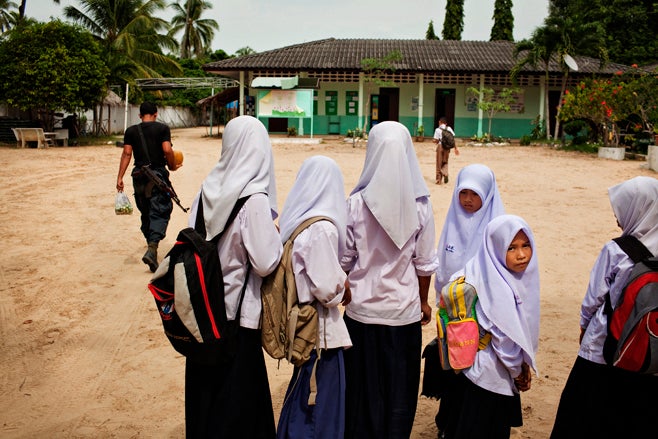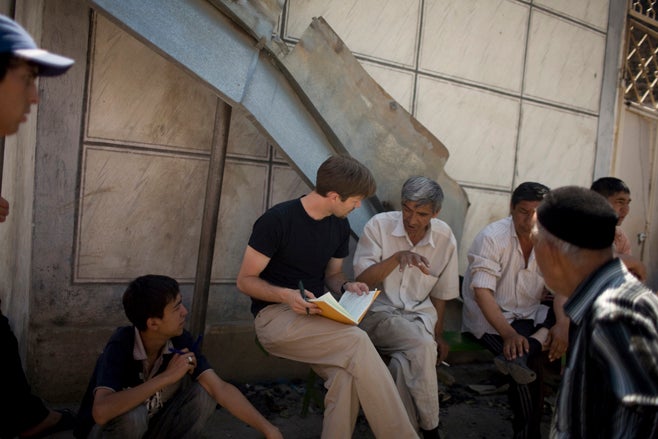The election in January of a new president pledging to promote human rights, and the opening of a crucial chapter on European Union membership talks in June, put human rights on the agenda in Croatia. But the gap between commitments and progress remained. There was little movement towards deinstitutionalizing persons with intellectual or mental disabilities, and questions about access overshadowed a long-awaited program to benefit Serb former tenancy rights holders. In absentia trials and concerns over fairness undercut domestic war crimes prosecutions, and the EU called into question Croatia's commitment to freedom of expression and information.
Rights of Persons with Disabilities
More than 9,000 persons with intellectual or mental disabilities remained in institutions as of September, with numbers rising. A master plan for deinstitutionalization and extensive social welfare reforms, both expected in 2010, have yet to be published at this writing. There were also few advances in creating community-based housing and support programs, such as personal assistants and other help with daily activities that would allow people to leave institutions.
There was no progress in reforming the legal capacity system, which routinely results in persons with intellectual or mental disabilities being denied the ability to make decisions and exercise rights, contributing to their institutionalization.
In September the State Attorney's Office in Rijeka brought criminal charges against the former director of Lopaca Psychiatric Hospital for 2008 abuses against Ana Dragicevic, who was forcibly institutionalized because of her sexual orientation, and four other unnamed patients.
The Croatian government and parliament again failed to amend the official Croatian translation of article 19 of the Convention on the Rights of Persons with Disabilities, which erroneously allows confinement in a residential institution to be categorized as a "community living option."
Return and Reintegration of Serbs
In September Croatian authorities issued a decision to permit former tenancy rights holders to buy apartments at discounts of up to 70 percent. The decision could remove a long-standing obstacle to Serbs returning to urban areas, although the United Nations High Commisioner for Refugees (UNHCR) noted that application deadlines and evidential requirements could impede access. The program has yet to commence at this writing.
In the first six months of 2010, 203 refugees-all ethnic Serbs-returned to Croatia. UNHCR estimates that 10,000-15,000 of the approximately 70,000 registered Croatian Serb refugees might consider returning to Croatia if problems with housing and pensions are addressed. As of June there were 2,246 internally displaced persons in Croatia, of whom approximately 1,600 were Serbs.
There were ongoing delays in government-sponsored social housing programs for returnees. As of June, 7,456 of the 13,187 families who applied had been allocated housing, of which 4,623 were Serbs. Around 3,300 families were still waiting for eligibility decisions.
The slow process of recognizing wartime work by Serbs in formerly rebel-held areas for pension eligibility continued. As of May, 18,848 of approximately 22,000 requests had been processed, although only 56 percent were resolved positively, in part because of disputes about admissible evidence. In some regions, positive outcomes were as low as 30 percent, compromising the financial security of returnees.
War Crimes Accountability
The trial of Croatian generals Ante Gotovina, Ivan Cermak, and Mladen Markac at the International Criminal Tribunal for the Former Yugoslavia (ICTY) for war crimes and crimes against humanity against Serbs concluded in September, with a decision expected at the end of 2010. At the request of Croatian Prime Minister Jadranka Kosor, the Croatian government created a task force in October 2009 to search for documents related to the case that the ICTY prosecutor alleged were in the government's possession. The trial concluded without these documents.
In March 2010 the Croatian Supreme Court confirmed the acquittal of General Rahim Ademi, and reduced the sentence of General Mirko Norac for war crimes against Serb civilians from seven to six years, relying on his service in the Croatian Armed Forces as mitigation. It remained the only case transferred from the ICTY to Croatia.
Croatian investigations into war crimes committed by members of the Croatian Armed Forces increased in 2010. In the first nine months of the year, Croatian authorities issued new war crimes indictments against 25 individuals, 11 of whom were Serbs. But Serbs remained the majority of defendants in domestic war crimes prosecutions. Ten trials, involving 13 Serb and 5 other defendants were completed in the same period, 16 of whom were convicted. Another 17 trials involving 29 Serbs and 14 Croats were still ongoing. In absentia war crimes trials remained a problem, with 23 Serbs and 7 others not present to defend themselves.
In September the Court of Bosnia and Herzegovina enforced a Croatian war crimes conviction and eight-year sentence against former Croatian MP Branimir Glavas, following a request from the Croatian Justice Ministry. Glavas, a Bosnian citizen, fled to Bosnia in May 2009 on the same day he was convicted in the Zagreb district court. Bosnian police arrested him after the court ruling which, barring a successful appeal, will see Glavas serve his sentence in Bosnia.
Asylum and Migration
Croatia passed amendments to its asylum legislation in July 2010, requiring quicker judicial review of detention decisions of asylum seekers and increased support to those granted asylum or subsidiary protection, in an effort to move closer to European and international standards. But there were continuing problems with its practices, including delays in processing claims and a lack of access to a state-funded lawyer at first instance and for those seeking to challenge their detention. The refugee recognition rate remained below 10 percent in the second half of 2009 and the first half of 2010.
Croatia lacked a strategy to respond effectively to the increasing numbers of unaccompanied migrant children (160 in 2009, with very few in previous years). Key problems included an overstretched guardianship system, the absence of a tracking system (with some children disappearing), and lack of access to a state-funded lawyer for children who do not claim asylum.
Media Freedom
Journalists faced government pressure because of their reporting. Sergej Trajkovic and Tomislav Kukec, two journalists from the newspaper Jutarnji List, faced government attempts to block publication of reports about commercial abuses within the meat industry, including lack of government oversight in regulating the industry.
In April police in Zagreb interrogated and searched the home of Marko Rakar, a prominent blogger, after he published a leaked list of registered war veterans. The government had resisted efforts to release the list, which civil society activists believe contains people fraudulently receiving pensions as war veterans.
The trial of six suspects in the double murder in 2008 of prominent journalist Ivo Pukanic and his marketing director Niko Franjic ended in November, with the conviction of all six for first degree murder. Sentences ranged from 15 to 40 years.
Human Rights Defenders
Human rights defenders in Croatia remained free to operate but reported difficulties accessing information from Croatia's national and local authorities.
In May, for the third successive year, Croatia's parliament examined but then failed to adopt the People's Ombudsman's annual human rights report. Parliament offered no explanation for its decision.
Key International Actors
The EU remained the most influential international actor in Croatia. The opening of the justice and fundamental rights chapter in June offered encouragement to Croatia, although the challenges of closing the chapter were highlighted in the European Commission progress report released in November, which identified domestic war crimes accountability, freedom of expression, deinstitutionalization of persons with disabilities, and treatment of the Serb and Roma minorities as ongoing areas of concern.
The UN Human Rights Council conducted its first universal periodic review of Croatia in November, calling on Croatia to address concerns about the fairness of domestic war crimes trials and improve its treatment of persons with disabilities and the Serb and Roma minorities.
During a visit to Croatia in April, the Council of Europe commissioner for human rights Thomas Hammarberg identified the importance of addressing housing and other obstacles to return of IDPs and refugees; the need to improve fairness in war crimes proceedings; and the need to tackle access to housing, employment, education, and statelessness of Roma.
After her July visit to Croatia the UN special rapporteur on the right to housing identified the need for available and transparent post-war housing programs for Serb returnees as a key challenge.



